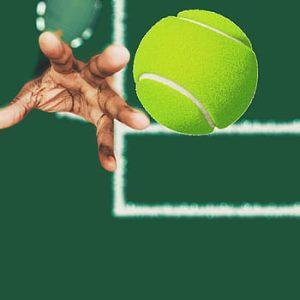We may earn money or products from the companies mentioned in this post.
Introduction to Wildcards in Tennis

Tennis is a fiercely competitive sport that attracts millions of fans around the world Each year, numerous tournaments are held where professional players showcase their skills and compete for glory While most participants earn their way into these tournaments through ranking points or qualifying matches, there is another way for players to secure a spot – the wildcard
Definition of a wildcard in tennis
In tennis, a wildcard refers to an invitation granted to a player who does not meet the usual criteria for direct entry into a tournament It allows individuals who may have lower rankings or limited competitive experience to compete alongside established players on the professional circuit
Wildcards are typically allocated by tournament organizers or national tennis associations, who have the discretion to select players they believe will bring additional excitement and interest to the event
Purpose and importance of wildcards in tournaments
The allocation of wildcards serves several purposes within tennis tournaments:
-
Showcasing emerging talents:
Wildcards provide an opportunity for young and promising players to gain exposure at higher-level competitions They allow talented individuals who might not have had sufficient time or opportunities to accumulate ranking points to demonstrate their potential against more established opponents -
Boosting local interest:
In some cases, wildcards are awarded to local players from the host country or region This helps generate excitement among home fans and ensures representation from different nations, adding diversity and creating a sense of national pride -
Promoting fan engagement:
By including wildcards in tournaments, organizers can create storylines and narratives that capture audience attention The presence of unexpected contenders adds an element of unpredictability and intrigue, making matches more enticing to watch
Types of tournaments where wildcards are awarded
Wildcards can be found in various types of tennis tournaments:
-
Grand Slam events:
The four prestigious Grand Slam tournaments – Australian Open, French Open, Wimbledon, and the US Open – often allocate wildcards to deserving players These events attract global attention and provide a platform for rising stars to make their mark on tennis history -
Masters 1000 series:
The Masters 1000 series consists of nine elite tournaments held throughout the year Wildcards are frequently granted in these events, allowing emerging talents or comeback players to compete against the world’s top-ranked professionals -
ATP and WTA tour events:
Numerous ATP (Association of Tennis Professionals) and WTA (Women’s Tennis Association) tour events feature wildcard entries These competitions offer opportunities for players to earn valuable ranking points while gaining experience on the professional circuit
In conclusion, wildcards play a significant role in tennis tournaments by providing opportunities for underdogs and up-and-coming talents to shine alongside established players They not only contribute to the overall excitement of the event but also help promote inclusivity and diversity within the sport
Criteria for Awarding Wildcards

Factors considered by tournament organizers
When it comes to awarding wildcards in tennis tournaments, there are several factors that organizers take into consideration These factors help ensure a fair and competitive field while also attracting attention from fans and the media
Player’s national or international ranking
The first factor that tournament organizers consider is the player’s national or international ranking This provides an objective measure of a player’s skill and competitiveness Higher-ranked players have proven themselves on the court and are more likely to receive a wildcard entry
Past performance in the tournament or other similar events
Tournament organizers also look at a player’s past performance in the specific tournament or other similar events If a player has had success in the past, it shows their familiarity with the conditions and their ability to perform well under pressure This makes them strong contenders for a wildcard spot
Potential crowd draw or media attention
In addition to assessing a player’s skills, organizers consider their potential as crowd draws or media attractions Tennis is not just about playing; it is also about entertaining spectators and engaging with fans Players who have a larger fan base or generate significant media attention are more likely to be awarded wildcards
Players returning from injury or long hiatus
Tournament organizers may give special consideration to players who are returning from injury or have been away from the game for an extended period of time due to personal reasons These players may have lost their ranking but still possess great talent and can add excitement to the tournament
Youthful talent with potential
Last but not least, tournament organizers often allocate wildcards to young and upcoming players who show great potential These players may not have a high ranking yet but have demonstrated promising skills and achievements in their junior or lower-level competitions Wildcards provide them with an opportunity to showcase their talent on a bigger stage
Qualifying tournaments for earning wildcard spots
To determine who earns wildcard spots, tournament organizers often hold qualifying tournaments These tournaments allow players who did not receive direct entry into the main draw to compete for a limited number of wildcard positions
Players participating in the qualifying tournaments face off against each other, battling it out on the court to prove their worthiness for a spot in the main draw These qualifying matches can be intense and highly competitive as players fight for their chance to make it into the tournament The top performers from these qualifying events are then awarded wildcard spots in the main draw
Earning a wildcard through qualifying tournaments provides an avenue for lesser-known players to break into the professional ranks and gain valuable experience competing against higher-ranked opponents It adds an element of excitement and unpredictability to the tournament while giving rising stars an opportunity to shine
Famous Examples of Successful Wildcard Entries

Wildcard entries in sports tournaments often lead to thrilling underdog stories that capture the hearts of fans around the world Let’s take a look at some famous examples of wildcard players who defied the odds and left an indelible mark on their respective sports
Goran Ivanišević’s historic Wimbledon win in 2001
In what can only be described as a fairytale ending, Croatian tennis player Goran Ivanišević clinched the Wimbledon title in 2001 as a wildcard entrant Despite being ranked outside the top 100 due to injury setbacks, Ivanišević displayed sheer determination and incredible skills to defeat his opponents one by one, culminating in an epic victory over Patrick Rafter in a gripping five-set final
Kim Clijsters’ US Open victory in 2009 after coming out of retirement
Kim Clijsters, a former world number one, made headlines when she decided to come out of retirement and receive a wildcard entry into the US Open in 2009 Many doubted her ability to compete at such a high level after years away from professional tennis However, Clijsters silenced her critics with remarkable displays of power and finesse, ultimately winning the tournament and becoming the first wildcard player ever to claim a Grand Slam title
Nick Kyrgios’ breakthrough at the Australian Open as a teenager
At just 19 years old, Australian tennis prodigy Nick Kyrgios burst onto the scene at his home Grand Slam tournament – the Australian Open – with an exceptional wildcard run in 2015 With his explosive serve and fearless playing style, Kyrgios defeated higher-ranked opponents en route to reaching the quarterfinals His electrifying performances captivated fans and showcased his immense potential as a future star of the sport
Pros and Cons of Wildcard System

Advantages
- Opportunity for lower-ranked players to compete at higher levels: The wildcard system provides a chance for talented but lesser-known players to showcase their skills on a bigger stage, gaining exposure and valuable experience against top-ranked adversaries
- Attracting marquee players who may not have qualified: Wildcard entries entice high-profile players who may have missed out on direct qualification due to injuries or other circumstances This adds excitement and star power to tournaments
- Encouraging local talent development and representation: Wildcards often go to promising young talents from the host country, giving them an opportunity to compete alongside established stars and inspire future generations
Disadvantages
- Allegations of favoritism towards certain players: The wildcard system has faced criticism in some instances, with accusations that certain players receive preferential treatment when being granted wildcards, potentially undermining the fairness of the competition
- Reduces opportunities for deserving players within regular rankings: Critics argue that awarding wildcards takes away chances from players who have worked hard to earn their rankings through consistent performance throughout the season
- Possibility that some wildcard entrants don’t perform well, leading to one-sided matches: While wildcard entries can produce remarkable success stories, there is also the risk that some participants might struggle against higher-ranked opponents, resulting in lopsided matches that lack competitiveness
Useful Links

Tennis Jargon Explained: From Wild Cards To Lucky Losers
What Does Tennis WC (Wild Cards) Mean?
Wild Cards – The Championships …
Wild card (WC). Meaning in tennis. Definition. Wiki. Terms
Australian Open 2023 wildcards: Which men’s and …
Tennis Ireland Wild Card Policy
ATP WILDCARD SURVIVOR EVENT – Delray Beach Open
Who decides who gets a wild card? : r/tennis
Wildcard application and selection process – ATP …
Solving the Wildcard Issue in Tennis
NCAA Singles Champion Quinn Earns US Open Wildcard
How Do Tennis Players Get Wildcards? [Qualifying]
Williams & Boulter among Wimbledon wildcards
At tennis’s lower rungs, a spot in the U.S. Open main draw …
French Open 2023 Wildcards – Who Got the Invite
Wild cards – Heavy Topspin
Navarro, Kypson win USTA’s French Open wild cards
Full List of Wild Card Entries Announced For 2023 Miami …
Tennis Clash Wildcard Bags Opening: Worth Buying? – YouTube
Andre Agassi’s Ex-coach Asks Pertinent Question After …





